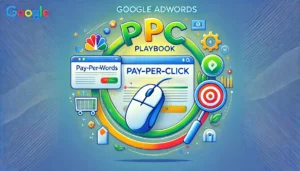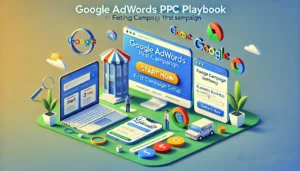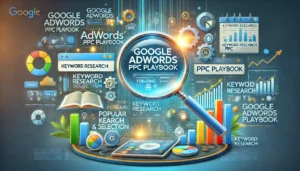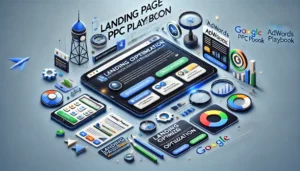The Google Adwords PPC Playbook Every UK Digital Marketer Needs to Read

Google Adwords PPC is a powerful tool for digital marketers in the UK. It helps businesses reach their target audience, increase website traffic, and boost sales. This playbook will guide you through the essentials of Google Adwords PPC, from setting up your first campaign to mastering advanced strategies. Whether you’re a beginner or an experienced marketer, this guide has something for everyone.
Key Takeaways
- Google Adwords PPC can help you reach your target audience and increase sales.
- Setting up your first campaign involves creating an account, choosing a campaign type, and setting a budget.
- Keyword research is crucial for selecting the right keywords to target in your ads.
- Writing compelling ad copy and optimising landing pages can significantly improve your campaign performance.
- Advanced bidding strategies and using Google Adwords tools can help you get better results and stay ahead of the competition.
The Google Adwords PPC Playbook: Understanding the Basics
What is Google Adwords PPC?
Google Adwords PPC, or Pay-Per-Click, is an advertising model where advertisers pay a fee each time their ad is clicked. Essentially, it’s a way of buying visits to your site, rather than attempting to earn those visits organically. Google Adwords PPC is particularly effective for driving qualified traffic to your website, as it targets users who are actively searching for products or services like yours.
Why Choose Google Adwords for PPC? (The Google Adwords PPC Playbook)
Google Adwords is the most widely used PPC platform, and for good reason. It allows us to create highly targeted campaigns that can reach potential customers at the exact moment they’re searching for what we offer. This makes it an invaluable tool for any PPC ad agency looking to maximise their return on investment. Moreover, Google Adwords offers a range of features and tools that help us optimise our campaigns for better performance.
Key Terminologies in Google Adwords PPC
Understanding the key terminologies in Google Adwords is crucial for running successful campaigns. Here are some of the most important terms:
- Keywords: The words or phrases that users type into the search engine.
- Ad Rank: Determines the position of your ad on the search results page.
- Quality Score: A metric that Google uses to determine the relevance and quality of your ads.
- Cost-Per-Click (CPC): The amount you pay each time someone clicks on your ad.
- Conversion Rate: The percentage of users who take a desired action after clicking on your ad.
Mastering these terms will give us a solid foundation for creating and managing effective PPC campaigns.
By understanding these basics, we can better navigate the complexities of Google Adwords and make more informed decisions that will benefit our PPC management efforts.
The Google Adwords PPC Playbook: Setting Up Your First Campaign
Creating a Google Adwords Account
First, head over to the Google Ads homepage. Click on the “Start Now” button in the top right corner. You’ll need to sign in with a Google account or create a new one. Once logged in, you’ll be prompted to enter your business name and website. This is where users will land when they click on your ad.
Choosing the Right Campaign Type (The Google Adwords PPC Playbook)
Next, you’ll need to select your campaign type. Google offers several options, including Search, Display, Shopping, and Video campaigns. Each type has its own strengths, so choose the one that aligns best with your advertising goals. For instance, if you want to drive traffic to your website, a Search campaign might be the best fit.
Setting Your Budget and Bids
Setting a budget is crucial. Google Ads allows you to set a daily budget, ensuring you don’t overspend. You can also choose between manual and automated bidding strategies. Manual bidding gives you more control, while automated bidding uses Google’s algorithms to optimise your bids for the best results.
Pro Tip: Start with a smaller budget and gradually increase it as you see positive results. This way, you can test different strategies without risking too much upfront.
By following these steps, you’ll be well on your way to launching a successful Google Adwords campaign. Remember, the key to success is continuous monitoring and optimisation.
The Google Adwords PPC Playbook: Keyword Research and Selection
Importance of Keyword Research
Keyword research is the backbone of any successful Google Adwords campaign. It helps us understand what our audience is searching for and how we can meet their needs. Effective keyword research can significantly boost our ad performance and ROI. Without it, we might as well be shooting in the dark.
Tools for Effective Keyword Research (The Google Adwords PPC Playbook)
There are several tools available to make keyword research easier and more effective. Some of the most popular ones include:
- Google Keyword Planner
- SEMrush
- Ahrefs
- Moz Keyword Explorer
These tools provide valuable insights into search volume, competition, and even suggest related keywords that we might not have considered.
How to Select the Right Keywords
Selecting the right keywords involves more than just picking the ones with the highest search volume. We need to consider the relevance to our product or service, the competition level, and the search intent behind the keywords. Here are some steps to follow:
- Start with a broad list of potential keywords.
- Use keyword research tools to gather data on search volume and competition.
- Narrow down the list by focusing on keywords that are highly relevant to our business.
- Consider the search intent to ensure the keywords align with what our audience is looking for.
- Regularly review and update our keyword list based on performance data.
Remember, targeting the right keywords can make or break our Google Adwords campaign. It’s not just about getting clicks; it’s about getting the right clicks that convert.
By following these steps, we can ensure that our keyword strategy is aligned with our business goals and audience needs.
The Google Adwords PPC Playbook: Optimising Your Landing Pages
What Makes a Good Landing Page?
A good landing page is crucial for converting visitors into customers. One of the biggest reasons for this is that the value of a product or service isn’t clearly communicated to users when they arrive on the page. We need to ensure that our landing page reflects what the user is expecting to see. This means having a clear headline, relevant images, and a strong call to action.
A/B Testing for Landing Pages (The Google Adwords PPC Playbook)
A/B testing is a method where we compare two versions of a landing page to see which one performs better. This can be as simple as changing a headline or as complex as redesigning the entire page. By continuously testing and tweaking, we can find the optimal design that converts the most visitors.
Improving User Experience
Improving user experience (UX) on our landing pages is essential. This includes making sure the page loads quickly, is easy to navigate, and is mobile-friendly. A good UX can significantly reduce bounce rates and increase conversions. Remember, a happy visitor is more likely to become a customer.
Let’s always aim to create landing pages that not only attract visitors but also convert them into loyal customers.
The Google Adwords PPC Playbook: Advanced Bidding Strategies
Manual vs. Automated Bidding
When it comes to bidding on Google Adwords, we have two main options: manual and automated. Manual bidding allows us to set our own bid amounts for each keyword and ad group. This gives us more control but requires constant monitoring. On the other hand, automated bidding lets Google adjust bids based on our goals and competitors’ actions. Automated bidding can save time but might not always align perfectly with our strategy.
Bid Adjustments for Better ROI (The Google Adwords PPC Playbook)
Bid adjustments are a powerful tool to improve our return on investment (ROI). We can increase or decrease bids based on various factors like device type, location, and time of day. For instance, if we notice that mobile users convert better, we can set a higher bid for mobile traffic. Similarly, we can lower bids for locations that don’t perform well. This flexibility helps us allocate our budget more effectively.
Using Bid Strategies to Outperform Competitors
To stay ahead of the competition, we need to use advanced bid strategies. One effective approach is to bid on branded terms. This ensures that our ads appear when users search for our brand, preventing competitors from taking up valuable real estate. Another strategy is to set a cost per acquisition (CPA) target, where we only pay when a user converts. This can be more expensive but ensures that our spend is justified by actual conversions.
By mastering these advanced bidding strategies, we can significantly enhance our Google Adwords campaigns and achieve better results.
The Google Adwords PPC Playbook: Utilising Google Adwords Tools and Features
Google Keyword Planner
We all know that keyword research is the backbone of any successful PPC campaign. The Google Keyword Planner is an essential tool for this. It helps us discover new keywords, see how they might perform, and even provides cost estimates. Using this tool can significantly enhance our keyword strategy and ensure we target the right audience.
Ad Extensions and Their Benefits (The Google Adwords PPC Playbook)
Ad extensions are a fantastic way to make our ads more engaging and informative. They allow us to add extra information like phone numbers, site links, and more. This not only makes our ads more appealing but also improves our click-through rate. For example, including a call button can make it easier for potential customers to reach us directly.
Using Google Analytics with Adwords
Integrating Google Analytics with Adwords is crucial for tracking and analysing our campaign performance. This combination allows us to see how users interact with our site after clicking on our ads. We can track key metrics like bounce rate, session duration, and conversion rate. This data is invaluable for making data-driven decisions and optimising our campaigns for better results.
By leveraging these tools and features, we can take our Google Adwords campaigns to the next level, ensuring we get the best possible return on investment.
The Google Adwords PPC Playbook: Monitoring and Analysing Campaign Performance
Key Metrics to Track
To truly understand how well our Google Adwords campaigns are performing, we need to keep an eye on several key metrics. These include Click-Through Rate (CTR), Conversion Rate (CVR), and Cost Per Click (CPC). CTR shows us how often people click on our ads after seeing them. A high CTR usually means our ads are relevant and engaging. CVR, on the other hand, tells us how many of those clicks turn into actual conversions, like sales or sign-ups. Lastly, CPC helps us understand how much we’re paying for each click, which is crucial for managing our budget.
Using Google Adwords Reports (The Google Adwords PPC Playbook)
Google Adwords offers a variety of reports that can help us dive deeper into our campaign performance. These reports can show us which keywords are driving the most traffic, which ads are performing best, and even which times of day are most effective. By regularly reviewing these reports, we can make informed decisions about where to allocate our budget and how to tweak our campaigns for better results.
Making Data-Driven Decisions
Once we have all this data, the next step is to use it to make smarter decisions. For example, if we notice that certain keywords have a high CTR but low CVR, we might need to adjust our ad copy or landing pages. Similarly, if our CPC is too high, we might need to refine our bidding strategy. The goal is to constantly optimise our campaigns to get the best possible return on investment.
Conversion tracking allows us to track sales, app installs, or calls from our ads. This is essential for understanding which campaigns are truly effective and which ones need improvement.
By integrating Google Adwords with tools like Google Analytics, we can get an even clearer picture of our performance. This integration allows us to see how users interact with our site after clicking on an ad, providing valuable insights that can help us improve our overall marketing strategy.
The Google Adwords PPC Playbook: Scaling Your Campaigns
When to Scale Your Campaigns
Knowing when to scale your Google Adwords campaigns is crucial. We should look for consistent performance over a period of time. If our campaigns are delivering a steady return on investment (ROI) and our budget allows, it might be time to scale. Scaling too early can lead to wasted spend and poor results.
Strategies for Scaling Successfully (The Google Adwords PPC Playbook)
Scaling successfully involves a few key strategies:
- Increase Budget Gradually: Start by increasing your budget in small increments. This helps to avoid sudden spikes in spend and allows us to monitor performance closely.
- Expand Keyword List: Add new keywords that are relevant to your business. Use tools like Google Keyword Planner to find these keywords.
- Test New Ad Variations: Create multiple ad variations to see which ones perform best. This can help improve your Quality Score and ad performance.
- Utilise Ad Extensions: Make use of ad extensions to provide more information and increase click-through rates.
Avoiding Common Pitfalls in Scaling
Scaling comes with its own set of challenges. Here are some common pitfalls to avoid:
- Ignoring Data: Always base your scaling decisions on data. Use Google Analytics and Adwords reports to make informed decisions.
- Overlooking Quality Score: A low Quality Score can increase your costs and reduce ad visibility. Focus on improving your Quality Score by optimising your ads and landing pages.
- Neglecting Negative Keywords: Regularly update your negative keyword list to avoid irrelevant clicks and wasted spend.
Scaling your Google Adwords campaigns requires careful planning and execution. By following these strategies and avoiding common pitfalls, we can achieve sustainable growth and better ROI.
The Google Adwords PPC Playbook: Staying Updated with Trends
Latest Features and Updates
Google Adwords is always evolving. To stay ahead, we need to keep an eye on the latest features and updates. Google frequently rolls out new tools and functionalities that can significantly impact our campaigns. For instance, recent updates have introduced advanced machine learning algorithms that help in better targeting and ad placements. Staying informed about these changes can give us a competitive edge.
Adapting to Algorithm Changes (The Google Adwords PPC Playbook)
Algorithm changes can make or break our campaigns. Google often tweaks its algorithms to improve user experience, which can affect how our ads are displayed. We must adapt quickly to these changes to maintain our ad performance. This means regularly reviewing our strategies and making necessary adjustments. A proactive approach can help us avoid any negative impacts on our campaigns.
Continuing Education and Resources
The digital marketing landscape is dynamic, and continuous learning is essential. There are numerous resources available to help us stay updated. Online courses, webinars, and industry blogs are great ways to keep our knowledge fresh. Additionally, joining professional communities can provide valuable insights and support. By investing time in education, we can ensure our skills remain relevant and effective.
In the fast-paced world of digital marketing, staying updated is not just an option; it’s a necessity. Embracing new trends and technologies can lead to better results and a more successful campaign.
- Regularly check for Google Adwords updates.
- Adapt strategies based on algorithm changes.
- Engage in continuous learning through various resources.
Keeping up with the latest Google Adwords trends is crucial for staying ahead in the digital marketing game. Our team at PPC Geeks is dedicated to helping you navigate these changes and optimise your campaigns for the best results. Don’t miss out on the opportunity to enhance your advertising strategy. Visit our website for a free PPC audit and see how we can boost your performance today!
Conclusion
In summary, mastering Google AdWords is essential for any UK digital marketer aiming to excel in the competitive world of online advertising. By following the strategies and insights shared in this playbook, you can create effective PPC campaigns that drive traffic, generate leads, and boost sales. Remember, the key to success lies in continuous learning and optimisation. Stay updated with the latest trends, test different approaches, and always be ready to adapt. With dedication and the right knowledge, your Google AdWords campaigns can achieve remarkable results. Happy advertising!
Frequently Asked Questions
What is Google Adwords PPC?
Google Adwords PPC, or Pay-Per-Click, is an online advertising system where advertisers pay each time a user clicks on their ad. It helps businesses reach potential customers who are searching for related products or services on Google.
Why should I use Google Adwords for my PPC campaigns?
Google Adwords is one of the most effective platforms for PPC campaigns because it allows you to target specific audiences, control your budget, and measure the performance of your ads. It also offers various tools and features to optimise your campaigns.
How do I create a Google Adwords account?
To create a Google Adwords account, visit the Google Ads website and sign up using your Google account. Follow the prompts to set up your first campaign, choose your budget, and create your ads.
What are some key terminologies in Google Adwords PPC?
Some important terms in Google Adwords PPC include CPC (Cost Per Click), CTR (Click-Through Rate), Quality Score, and Ad Rank. Understanding these terms will help you manage and optimise your campaigns more effectively.
Why is keyword research important in PPC?
Keyword research is crucial because it helps you identify the terms and phrases that potential customers are using to search for products or services like yours. By targeting the right keywords, you can improve the relevance and performance of your ads.
What makes a good landing page?
A good landing page is relevant to the ad, loads quickly, and provides a clear call to action. It should be easy to navigate and offer valuable information to the user, encouraging them to take the desired action.
What is the difference between manual and automated bidding?
Manual bidding allows you to set your bids for specific keywords, giving you more control over your budget. Automated bidding uses Google’s algorithms to adjust your bids based on the likelihood of a click or conversion, aiming to maximise your campaign’s performance.
How can I track the performance of my Google Adwords campaigns?
You can track the performance of your campaigns using Google Adwords reports and Google Analytics. These tools provide insights into key metrics like clicks, impressions, and conversions, helping you make data-driven decisions to optimise your campaigns.
Author
Search Blog
Free PPC Audit
Subscribe to our Newsletter
The Voices of Our Success: Your Words, Our Pride
Don't just take our word for it. With over 100+ five-star reviews, we let our work-and our satisfied clients-speak for us.
"We have been working with PPC Geeks for around 6 months and have found Mark and the team to be very impressive. Having worked with a few companies in this and similar sectors, I rate PPC Geeks as the strongest I have come across. They have taken time to understand our business, our market and competitors and supported us to devise a strategy to generate business. I value the expertise Mark and his team provide and trust them to make the best recommendations for the long-term."
~ Just Go, Alasdair Anderson




